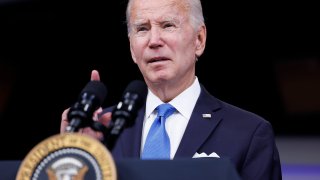
President Joe Biden announced this week that the Covid-19 national and public health emergencies declared by the Trump Administration in March 2020 will end on May 11.
The Office of Management and Budget issued a statement denouncing two Republican-sponsored bills aiming to end the emergencies immediately. Ending the orders in May, however, will give the health-care system and Medicaid recipients, especially, the time to "wind down" from the flexibilities offered through the emergency orders, according to the statement.
Additionally, the end of the emergencies would end restrictions on border entry known as Title 42, which the Biden administration has been trying to terminate separately.
The statement did not mention the pause on federal student loan payments and interest, which has been in place since the beginning of the emergencies, but officials say borrowers shouldn't worry.
Get New England news, weather forecasts and entertainment stories to your inbox. Sign up for NECN newsletters.
"Providing debt relief and pausing loan payments can continue after the formal end of the national emergency," an administration official said in a statement shared with CNBC Make It.
Though some have speculated that the end of the national emergency declaration could undermine the legal justification for continuing the payment pause, the Biden administration maintains its right to continue providing this relief to borrowers.
"Our debt relief plan is needed to prevent defaults and delinquencies as student borrowers transition back to repayment after the end of the payment pause," the official stated. "The national emergency formally ending does not change that fact. It also does not change the legal justification for the plan."
Money Report
Federal student loan payments are set to resume on June 30, depending on when the Supreme Court issues a decision on Biden's debt forgiveness plan. The court will hear oral arguments at the end of this month with a decision expected at the end of June.
The White House announced last week it approved 16 million applications for student debt forgiveness out of 26 million borrowers who applied before the courts barred the relief from going out and more applications from being approved until a final decision is reached.
It's unclear what the administration has planned if the court strikes down forgiveness, but it has taken other steps to help borrowers, like making changes to income-driven repayment plans and canceling debt for defrauded borrowers.
Sign up now: Get smarter about your money and career with our weekly newsletter
Don't miss: Student debt forgiveness is on hold for now—here’s why it’s blocked and what could happen next






